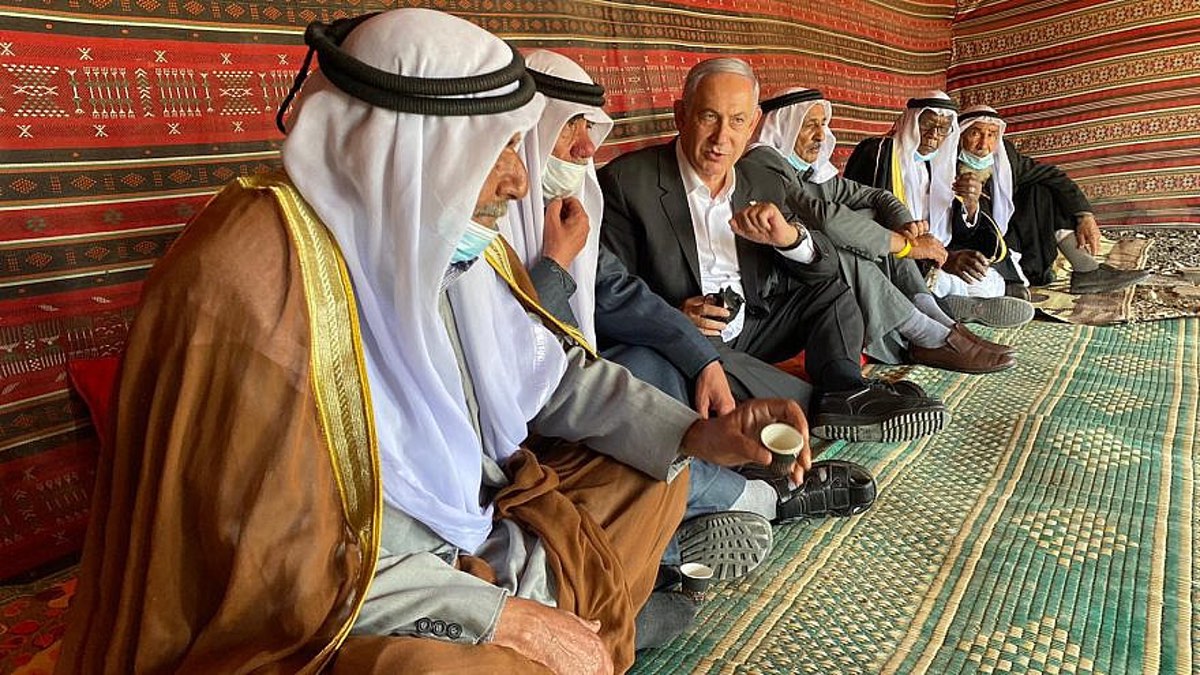(JNS) Israeli Prime Minister Benjamin Netanyahu’s effort to gain Israeli Arab votes by emphasizing his practical policy towards them by aiding with issues that concern them appears to be gaining traction. He has been seen in the media sitting with Bedouin sipping tea, visiting the Bedouin city of Rahat in the Negev and playing soccer on the beach with Arab children all to court a new swath of voters.
Mansour Abbas, the head of the United Arab List Party (UAL, also known by its Hebrew acronym, Ra’am)—the political branch of the southern branch of the Islamic Movement—broke off from the Arab Joint List of parties after angering them for seeking to improve ties with Netanyahu and the government.
Arik Rudnitzky of the Israel Democracy Institute and Tel Aviv University’s Moshe Dayan Center told JNS that “it appears that many in the Arab public do not believe that the Knesset can further their interests.”
“But they do believe that the government is the real power-broker,” he said.
Against the backdrop of the social and economic crisis following the coronavirus pandemic in the past year and increasing bloodshed due to rising criminal incidents in the Arab sector, “quite a significant portion of the Arab voters will support Netanyahu, hoping that he will take care of their burning needs.”
An in-depth analysis of a survey carried out by the Konrad Adenauer Program for Jewish-Arab Cooperation at the Moshe Dayan Center reveals that those who intend to vote for Likud pay less attention to the party’s ideology and political platform than those who intend to vote for the Joint List.
“In other words, the ‘Likud Arab voter’ is not necessarily identified with Zionist ideology, but rather, is interested in getting results here and now,” explained Rudnitzky.
Surprisingly, according to the survey, the most qualified candidate for prime minister in the Arab sector is Netanyahu (24.9 percent), followed by Ahmad Tibi (Ta’al) of the Joint List (14.3 percent), and then Joint List and Hadash head Ayman Odeh. It also found that half of the Arab voters (46 percent) support an Arab party’s participation in any government after the elections.
And it discovered that the Joint List—made up of the Communist Hadash, nationalist Balad and Tibi’s Ta’al Party—would receive around eight Knesset seats while Abbas’ UAL would barely squeak into the Knesset with the minimum four seats.
‘A deeper reason at play for the breakup’
Shaheen Sarsour, veteran Arab political observer and a former adviser to various Arab Knesset members, told JNS that the Joint List did not want the UAL to remain part of it, even though Abbas preferred to stay inside the Arab block.
“This was due to several factors—the major one being the other parties in the Joint List were angry at Abbas for his outreach to Netanyahu,” he said. “I think there is a deeper reason at play as well for the breakup, which is that it became a war of egos between Abbas, Odeh and the popular politician Ahmad Tibi.”
“Odeh and Tibi were probably unhappy seeing Abbas in the spotlight and gaining all of the attention for his warming to Netanyahu,” continued Sarsour.
The UAL, as part of the Islamic Movement, has strong grassroots support, and Sarsour predicts that it will make it into the next Knesset, passing the electoral threshold.
The Islamic Movement has an extensive social network and can utilize it for political gain, similar to other Muslim Brotherhood groups.
According to Sarsour, the position that Abbas took was: “We are fed up with always being angry and attacking the government. We want to influence the government on issues that affect the Arab public like violence and the lack of housing in the Arab sector.”
In a way, Netanyahu created the fracture within the Joint List, thus weakening the anti-Netanyahu block of parties on the left.
It is unlikely that Mansour Abbas would join a Netanyahu government—not only because Netanyahu himself has dismissed the idea but also because his right-wing coalition partner, Religious Zionism, might refuse to sit in such a government.
Despite the cordial relations between Abbas and Netanyahu, the UAL is part of the Islamic Movement that seeks to Islamize Israeli Arabs and, in the long term, to transform Israel into an Islamic state. That said, any partnership could only go so far.
Still, in the post-election coalition negotiations, Abbas could play a kingmaker role by joining the anti-Netanyahu block or not.

